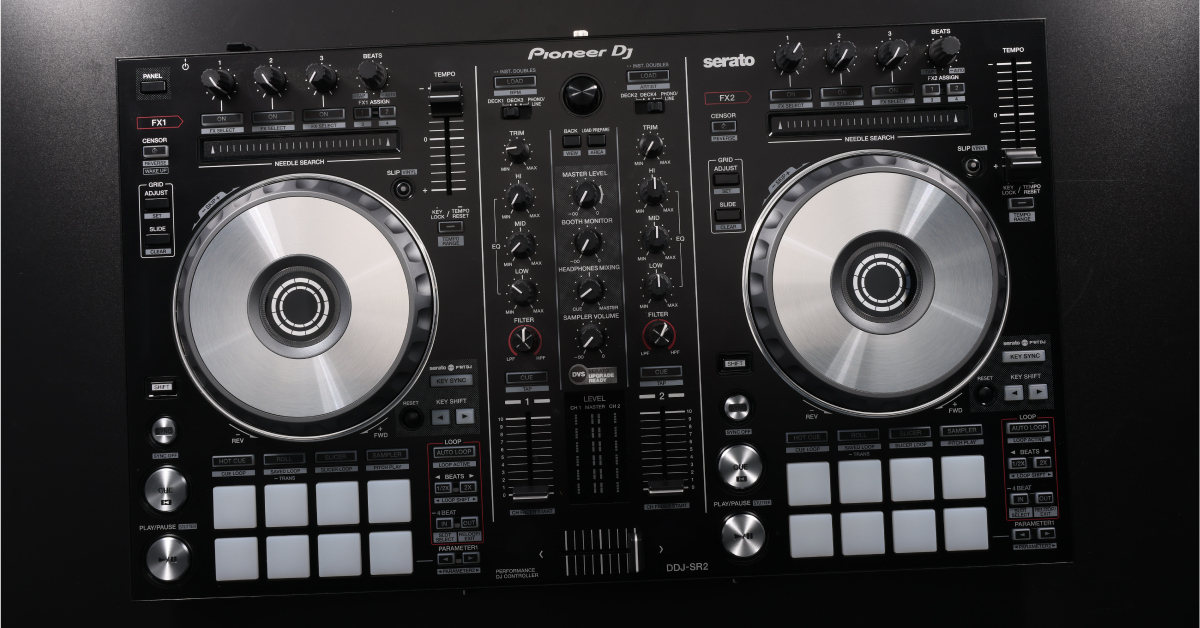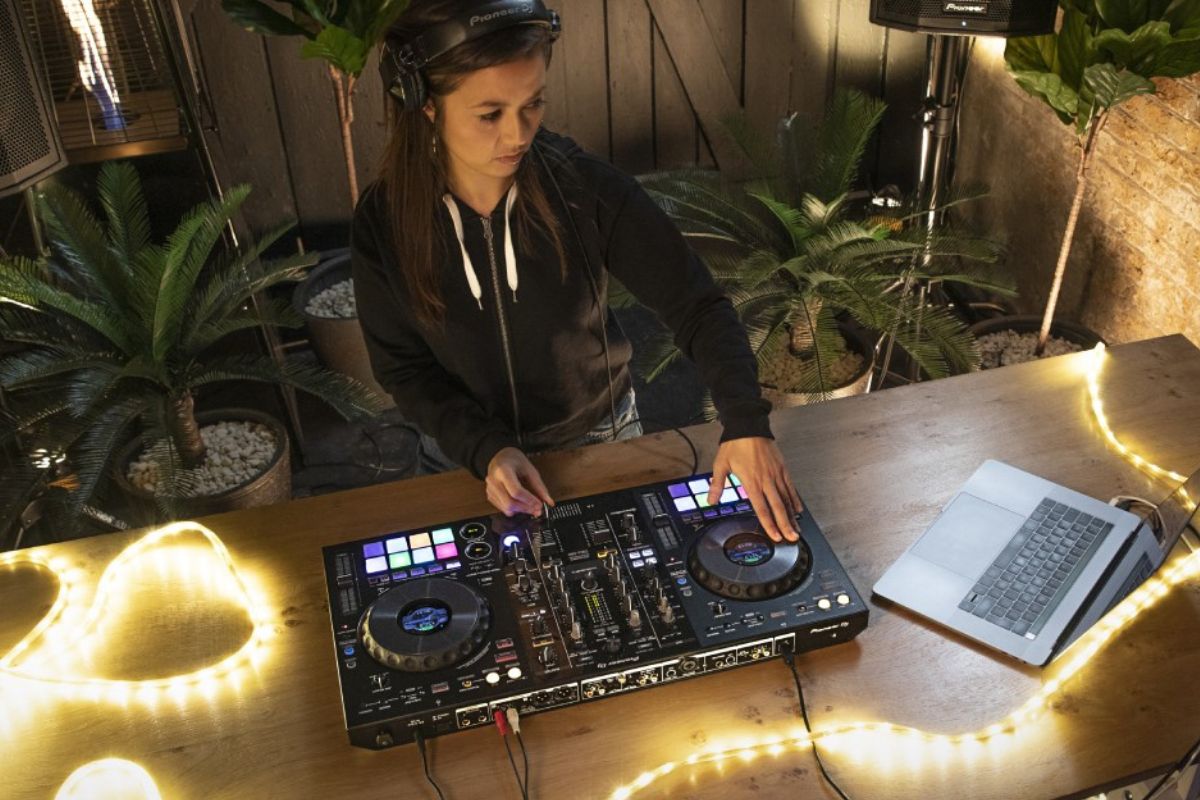A DJ controller is a device that allows DJs to mix music using a digital interface, while a DJ mixer is a hardware device specifically designed for blending and transitioning between songs. DJ controllers typically include jog wheels, pads, and other control surfaces, while DJ mixers focus on audio mixing functionality with crossfaders, EQ knobs, and more.
Both devices serve different purposes in the DJ setup, with controllers offering a broader range of features and integration with DJ software, and mixers providing more advanced audio mixing capabilities for live performances and studio work. DJ controllers and DJ mixers are essential tools in the world of modern DJing, each serving a distinct purpose within the DJ setup.
Understanding the differences between these two devices is crucial for DJs looking to create seamless mixes and deliver captivating performances. We’ll delve into the disparities between DJ controllers and DJ mixers, exploring their unique features and functionalities to help you make an informed decision about which one best suits your DJing needs. Whether you’re a budding DJ or a seasoned professional, having a clear understanding of these essential tools is paramount for taking your DJ skills to the next level.

Credit: www.sweetwater.com
What Is A Dj Controller?
A DJ controller is a device that allows DJs to manipulate and mix music using various interfaces and controls. Unlike traditional DJ setups, which require separate components like turntables, mixers, and CDJs, a DJ controller combines all these elements into a single unit, providing a more streamlined and portable solution for modern DJs.
Definition
A DJ controller is a compact and integrated system that includes all the necessary components for mixing and controlling music, such as jog wheels, faders, buttons, and knobs. It typically interfaces with DJ software running on a computer, providing tactile control over the software’s features and functions.
Features
- Integrated audio interface for connecting to speakers and headphones
- Touch-sensitive jog wheels for scratching and cueing
- Assignable and backlit pads for triggering samples and loops
- Mixer section with EQ, volume, and crossfader controls
- Integration with DJ software for accessing music libraries and effects
- Compact and portable design for easy transport and setup

Credit: au.rollingstone.com
What Is A Dj Mixer?
DJ mixers are an essential piece of equipment for any DJ, allowing them to seamlessly blend and manipulate multiple audio sources. Let’s take a closer look at what a DJ mixer is and its key features.
Definition
A DJ mixer is a device used by DJs to blend and modify different audio signals, including combining tracks, adjusting volume levels, applying effects, and transitioning between songs during a performance or mix.
Features
- Multiple Channels: DJ mixers typically have multiple channels, allowing DJs to mix and transition between various audio sources, such as turntables, CDJs, or media players.
- Equalization Controls: Most DJ mixers are equipped with equalization knobs or sliders for adjusting the bass, midrange, and treble frequencies of each audio signal.
- Crossfader: The crossfader enables smooth transitions between two audio sources, essential for creating seamless mixes and transitions.
- Effects: Many modern DJ mixers come with built-in effects processors, allowing DJs to add creative elements and manipulate the sound of their mixes.
- Monitoring: DJ mixers often feature headphone outputs and cueing controls, allowing DJs to listen to one source while the audience hears another.
- Connectivity: DJ mixers may offer a range of connectivity options, such as USB, phono, line, and microphone inputs, to accommodate various audio devices and sources.
Key Differences Between Dj Controller And Dj Mixer
Understanding the differences between a DJ controller and a DJ mixer is essential for aspiring DJs and music enthusiasts. These tools play a crucial role in managing and manipulating sound in a DJ setup. While both devices serve a similar purpose, they have distinct functionalities, layouts, and connectivity options that set them apart. In this article, we will explore the key differences between a DJ controller and a DJ mixer.
Functionality
The functionality of a DJ controller and a DJ mixer is the primary factor that differentiates these two devices. A DJ controller, also known as a MIDI controller, is a compact unit that integrates various components, including a mixer, jog wheels, faders, and buttons. It is designed to emulate the functionality of traditional DJ equipment.
On the other hand, a DJ mixer focuses solely on the mixing aspects of a DJ’s performance. It combines audio channels, allowing DJs to blend and transition between tracks seamlessly. DJs can manipulate EQ, add effects, and control the volume levels of different audio sources using the mixer’s dedicated knobs, faders, and switches.
Layout
When it comes to layout, DJ controllers and DJ mixers exhibit noticeable differences. A DJ controller typically features a horizontal arrangement, resembling a traditional mixer layout with additional controls for software integration. It often includes a central mixer section with two or more jog wheels, faders, and buttons, allowing DJs to have complete control over their music.
On the contrary, a DJ mixer is designed with a vertical layout, emphasizing the audio manipulation functions. The mixer section usually sits at the center, with crossfaders and channel faders placed at the top. EQ knobs, gain controls, and effect buttons are strategically positioned, enhancing the accessibility for DJs during live performances.
Connectivity
The connectivity options provided by a DJ controller and a DJ mixer also differ significantly. A DJ controller relies on a USB connection to interface with a computer or other devices. This allows DJs to control software-based DJ platforms, manipulate sound samples, and access a wide range of effects and features.
In contrast, a DJ mixer offers more versatile connectivity options. It typically provides a variety of input and output ports, including phono/line inputs, microphone inputs, booth outputs, and master outputs. This flexibility enables DJs to connect turntables, CD players, microphones, and other audio sources directly to the mixer, making it an ideal choice for DJ setups that involve mixing different music sources.
In conclusion, DJ controllers and DJ mixers differ in terms of functionality, layout, and connectivity. A DJ controller combines various components in a compact unit, while a DJ mixer focuses solely on mixing audio channels. DJ controllers typically feature a horizontal layout, emulating the functionality of traditional DJ equipment, while DJ mixers have a vertical layout that emphasizes audio manipulation functions. DJ controllers primarily rely on a USB connection, whereas DJ mixers offer more versatile connectivity options. Understanding these distinctions can help DJs choose the right equipment that suits their specific needs and preferences.
Choosing The Right Equipment For Your Setup
When setting up your DJ equipment, understanding the differences between a DJ controller and a DJ mixer is crucial. Both play a significant role in your setup, but choosing the right one depends on various factors.
Considerations
Before making a decision, consider your DJing needs, setup space, and portability requirements.
Budget
DJ controllers typically offer more features at a lower price point compared to DJ mixers, making them a cost-effective choice for beginners.
Skill Level
For novice DJs, a DJ controller with integrated features can be easier to navigate, while experienced DJs may prefer the versatility of a separate mixer and turntables.

Credit: www.amazon.com
Frequently Asked Questions On Dj Controller And Dj Mixer Differences
Do You Need A Mixer With A Dj Controller?
Yes, a mixer is often needed with a DJ controller for more control over sound output and effects.
What Is A Dj Mixer Used For?
A DJ mixer is used to blend and adjust the audio from multiple sound sources. It allows DJs to smoothly transition between songs and control the volume, EQ, and effects. The mixer enhances the overall sound quality and creates a seamless flow for a better listening experience.
What Is The Difference Between A Mixer And A Cdj?
A mixer blends and modifies audio signals, while a CDJ plays digital music files.
What Is A Dj Mixer?
A DJ mixer is a device that blends and transitions between audio tracks during a performance. It allows DJs to adjust the volume, EQ, and crossfade between different music sources to create seamless mixes. The mixer is a crucial tool for live performances and studio recordings.
Conclusion
To sum it up, understanding the differences between a DJ controller and a DJ mixer is crucial for aspiring DJs. While a DJ controller offers a versatile and feature-packed option for beginners and digital DJs, a DJ mixer provides enhanced control for professionals who prefer utilizing external equipment.
Selecting the right equipment ultimately depends on individual preferences, skill levels, and budget. By knowing the nuances, DJs can make informed decisions to elevate their performances to new heights.